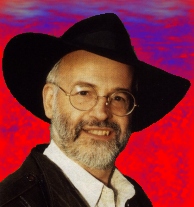
Terry Pratchett has, naturally, acquired quite a fan following, some of which congregates in alt.fan.pratchett. A webpage exists where most other Pratchett fan links can be found.
One jacket blurb claims that "Pratchett did for fantasy what Douglas Adams did for science fiction," which is an impressive understatement, considering that most of the fantasy genre is not humorous, and a lot of it isn't even funny. Pratchett's style is accessible, creating a vivid vision of his fantasy world, a disc-shaped world carried on the backs of four elephants, which in turn are supported by a world-sized turtle swimming through space.
The characters that populate this world, from the dour witch Esmeralda Weatherwax to the embodiment of DEATH are, though all meat for Pratchett's inimitable sense of humor, so personable that I find myself in their cheering sections every time. Oh, and the stories are funny too. If my brief summaries of the titles below make it sound as if they are political screeds, never fear. Pratchett has definite ideas on what's right and what's wrong, but he's got a gentle way of presenting his views that are unlikely to offend even people who disagree with him. And he'll make them laugh, while he's at it.
Update: I got to listen to Terry Pratchett speak on various panels at the 63rd WorldCon in Glasgow. He was surprisingly shy, I thought. He was also very gracious in spite of his fame and popularity.
Learn more about Terry Pratchett here.
- The Bromeliad: Truckers,
- Diggers,
- Wings - Little people, actually aliens from outer space, try to make their escape from a London department store before it gets demolished. This group of books is meant for the younger set, although I enjoyed them well enough.
- The Discworld Series: The Colour of Magic (1983), about Discworld's first tourist.
- The Light Fantastic (1986), continuing the story started in The Colour of Magic.
- Equal Rites (1987), a story about feminism and male chauvinism.
- Mort (1987) is a modern retelling of the Orpheus legend.
- Sourcery (1988) is a lesson about power.
- Wyrd Sisters (1988)
- Guards! Guards! (1989)
- Pyramids (1989)
- Moving Pictures (1990) lampoons Hollywood and suburbia.
- Eric (1990) is a recasting of the story of Faust.
- Witches Abroad (1991) tells you why fairy godmothers are dangerous.
- Reaper Man (1991), a story about progress and labor relations.
- Lords and Ladies (1992) explains why the Fair Folk are dangerous.
- Small Gods (1992) is an essay on religion.
- Men at Arms (1993)
- Soul Music (1994)
- Interesting Times (1994)
- Maskerade (1995) lampoons The Phantom of the Opera,
- Feet of Clay (1996) is an essay on consciousness and morality. from book to musical.
- Hogfather (1996) lampoons Christmas, though from the British perspective, which is a bit different from the American customs.
- Jingo (1997) is about war and the reasons we fight them. It was probably prompted by the Falklands' War.
- Last Continent (1998) is a kind of memoir about Pratchett's visit to Australia.
- Carpe Jugulum (1998) looks behind the romantic mask of vampires.
- The Fifth Elephant (1999) lampoons a certain Bruce Willis movie.
- The Truth (2000) is a paean to journalism.
- The Last Hero (2001) with Paul Kidby is an illustrated story for the younger set, a re-telling of the Prometheus myth, though with a twist.
- Thief of Time (2001) - competition for the tooth fairie?
- Nightwatch (2002) considers the problems of having a revolution and keeping the peace.
- Monstrous Regiment (2003) is a recap of the themes covered in Equal Rites, from a slightly different perspective, and with two decades of changed attitudes behind it. The title derives from a comment made by a contemporary of Elizabeth I who observed that there were far too many women in position of authority.
- Going Postal (2004) is a story about government reform.
- Thud! (2005) is about sectarian hatred.
- The Amazing Maurice and His Educated Rodents (2001) is billed as a children's book, but it contains some rather disturbing images for a children's book. On the other hand, I think children can deal with it. It's also quite enjoyable for adults.
- Wee Free Men (2003) is also supposed to be for children. It's a retelling of Hans Christian Anderson's story of the Snow Queen.
- A Hat Full of Sky (2004) concerns growing up when you're all on your own. This is probably the most conventional of the Discworld stories Pratchett has written for children.
- Strata (1981) - This is a science fiction concept for the discworld series. Interestingly enough, it seems to have been published two years before the first discworld story appeared - though that may be an artifact of the USAn publishing company's decision when to buy the story.
- Good Omens (1990) - co-written with Neil Gaiman, whose claim to fame to date appears to have been writing a series of illustrated novels (better known as "comic books") entitled Sandman, as well as a dark fantasy called Neverwhere which was made into a TV movie. Omens is as funny as any of the discworld stories, with, just possibly, a bit of a lesson slipped in.